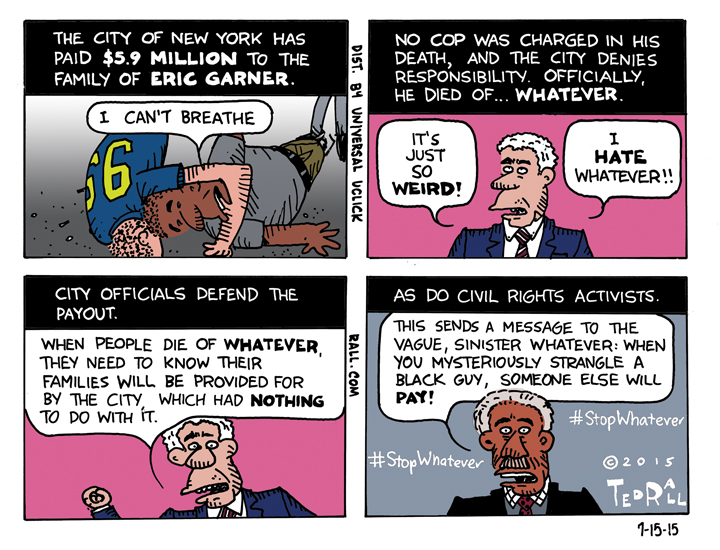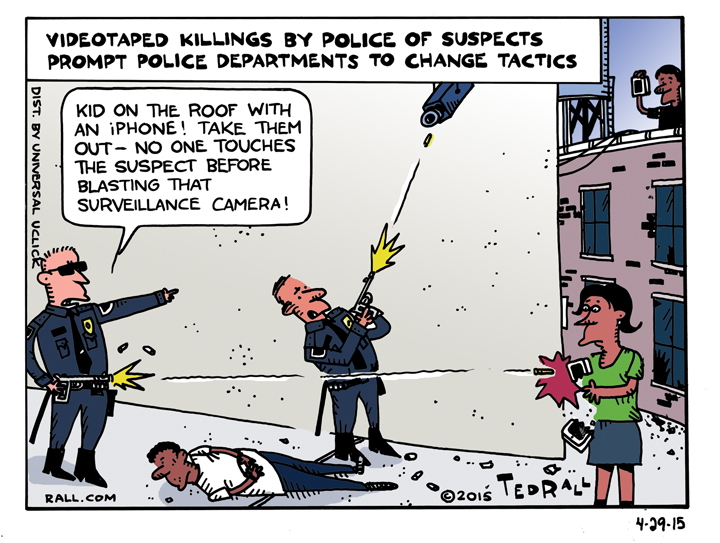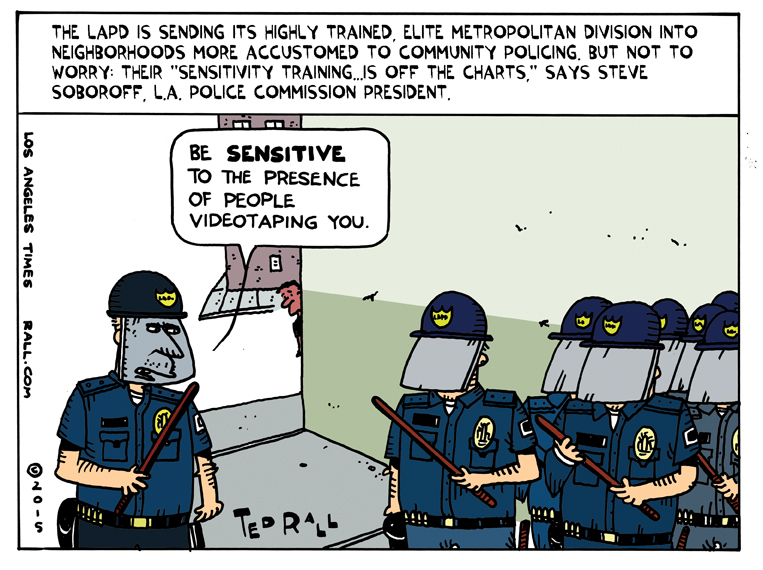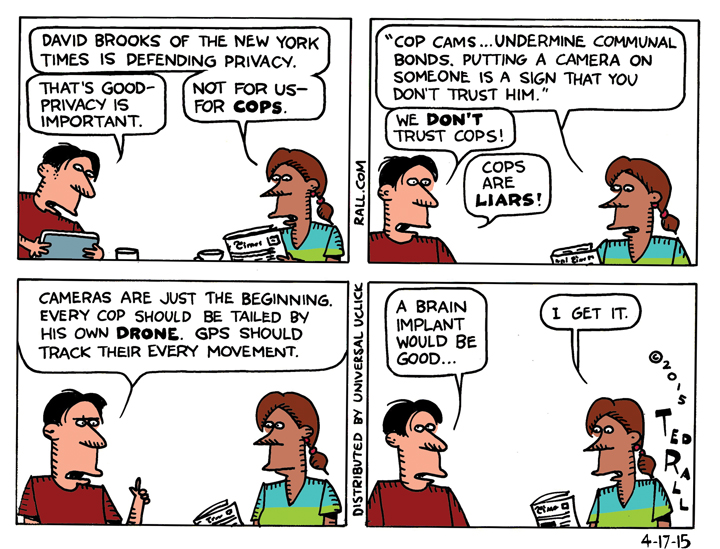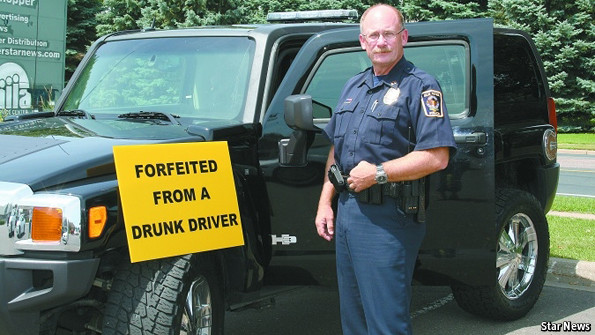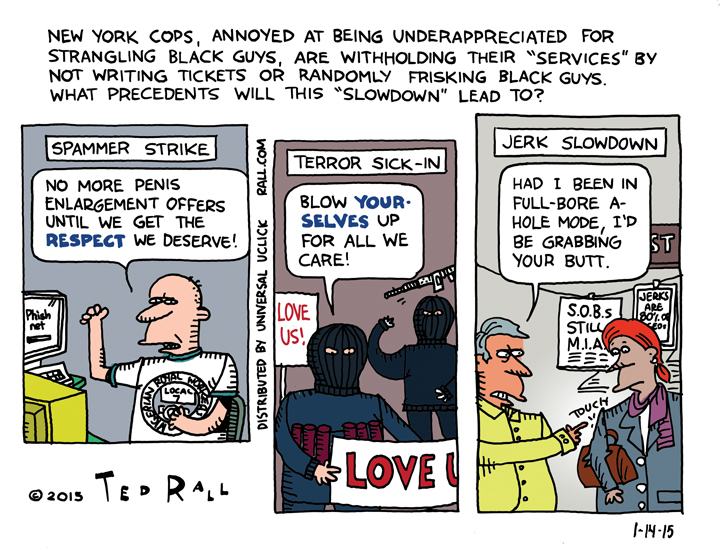On Monday night, I was in tears.
The editorial page editor of The Los Angeles Times, which has run my cartoons for six years, had called me to tell me that the paper would run an “Editor’s Note” announcing that they were firing me because I had lied about my treatment by a Los Angeles police officer when he arrested me for jaywalking in 2001.
I was about to be disgraced. Compared to Brian Williams and Jayson Blair. As a journalist, nothing is worse than being accused of willfully lying about a story. It’s the end of your career.
You’re dead.
Tuesday, when the piece appeared in print as well as online, word spread like wildfire that the police had a secret audiotape of my arrest. I had written in the Times that I had been treated rudely: shoved, handcuffed, and finally, the cop tossed my driver’s license on the ground. The audiotape, claimed my editor, proved that none of that had happened. It was, in fact, a polite encounter with a friendly officer.
The Internet exploded. Predictably, right-wing blogs led the charge, dutifully transcribing editor Nick Goldberg’s accusations against me, which he accepted at face value from the LAPD: Breitbart, Newsbusters, the usual gang of idiots. Soon Twitter was full of taunts. My email filled with mirthful, snarky insults.
Amid the chaos of my career falling apart. I asked people familiar with audio technology to check the LAPD-supplied tape, which contains about 20 seconds of talk and 6 minutes of unintelligible noise, for signs of tampering — and to see if there was any way to clean it up.
On Friday morning, I woke up like a kid on Christmas morn. But what I found in my in box was better than a bike and a skateboard: an enhanced audiofile that proves, unequivocally, that I was telling the 100% truth when I wrote that essay in May.
On the tape, you can clearly hear a female bystander shouting at the LAPD officer who’d stopped me for jaywalking to “take off his handcuffs.” She yells this twice.
Officer Will Durr responds first with a “No, no, no … ” and then by whistling loudly into the mic.
The enhanced tape clearly proves that the cops are lying, not me — and it even suggests cops might have knowingly tampered with the tape.
You can listen to the tape at ANewDomain.net. My incident is at the 03:30 mark.
You can hear a female witness — a witness the LAPD convinced my editors at the Times did not exist and I was making up — on the tape. She protests: “He was just jaywalking … you need to take off … you need to take off his handcuffs.” She says that at 3:30 and repeats it at 3:50.
To this, LAPD Officer Will Durr replies: “No, no, no, no, no.”
When the bystander persists in protesting the cop’s handcuffing my wrists, LAPD Officer Durr whistles. At the time of the incident, I was puzzled by his whistling, which seemed like unusual behavior. Now I believe I understand, that it is the officer’s technique to tamp down sounds (like protesting bystanders) that he doesn’t want on the recording.
The recorder was on his uniform secretly. I had no idea the encounter was being recorded or that a copy existed until this week.
Any way you look at it, the Los Angeles Police Department is lying. Cops lied when they said that I didn’t get handcuffed. They lied when they said I was mistaken about the presence of protesting witnesses. And they lied when they told my editors at The Los Angeles Times that I’m a liar who should be fired.
And the Los Angeles Times believed the LAPD, not me, their columnist. So they sacked me.
We know the officer deliberately used whistling to alter the recording. It is also clear that he deliberately muffled it.
It is the job of the media to question authority, not to blindly defend it and eat its own.
Even in its defense of the LAPD, the Times couldn’t be bothered to do due diligence. Editors made no effort to investigate longtime traffic Officer Will Durr’s bizarre claims that he has never, ever handcuffed anyone. I exposed that lie yesterday. The Times didn’t even bother searching its own website before siding with the LAPD.
If they can’t type “Will Durr” into a search field, I suppose it’s too much to expect the LA Times could be bothered to track down a sound engineer in L-friggin’-A?
Classic Streisand effect: In their attempt to discredit me and destroy my reputation as a journalist, the LAPD wound up discrediting themselves and further eroding its own reputation. And they’re taking the Times with them.
But the LAPD’s reputation has, of course, already been destroyed by decades of police brutality, systematic corruption and fatal police shootings of one unarmed black man after another.
Will the Times do the right thing: apologize, issue a retraction, and return my cartoons and blogs to the pages of the newspaper? I hope so.
What a week.
(Ted Rall, syndicated writer and the cartoonist for The Los Angeles Times, is the author of the book “Snowden,” the biography of the NSA whistleblower, to be published August 18th. Want to support independent journalism? You can subscribe to Ted Rall at Beacon.)
COPYRIGHT 2015 TED RALL, DISTRIBUTED BY CREATORS.COM

